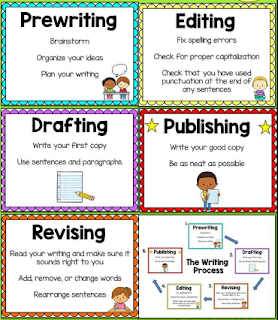In my LIT 102 class, one of the week's main focuses was the writing process. At first, I was not as enthused as my other colleagues were. I thought I already knew everything there was to know about the writing process. Boy, was I wrong!😲 It never occurred to me that within the prewriting stage, the focus is to generate different ideas, which include the topic, purpose, and audience. I already had an incite that one should focus on writing the content in the drafting stage and take another look at one's writing for refinement in the revising stage. However, regarding the editing stage, I had never given much thought until my classmates and I were informed that it may be wise to take a 'step back', meaning to leave one's writing for a while and come back to analyse the mechanics. 🤔
My colleagues and I were also informed that when the students finally publish their work, they can do it by reading to their classmates or the school assembly. This new knowledge of the writing process gives me a unique perspective as a teacher because I can now see myself being more cognizant of informing my students that in the prewriting stage, they should consider both the audience and the goal of their writing. When choosing a topic, a writer must also identify the writing piece they will produce, such as narrative, descriptive, persuasive, or expository. They should also consider writing everything that comes to mind on the chosen topic. Write continuously for several minutes. When finished, go through the freewriting and highlight words, phrases, and sentences useful in the writing.
Overall, and upon reflection, I am now more mindful that the writing process is essential to take the ideas and information gathered during the prewriting process and organise it into a logical format, which makes one's writing more organised. This can take the form of an outline, but it could also be a story map, a series of pictures, or a list, and the information should be ordered to support the thesis statement in the best way. The images below illustrates the steps required in each stage of the writing process.

(pictures retrieved from: www.buzzingwithmsb.com.;www.i.pinimg.com.)



Hi Denisha, the point that Mrs.Lazarus made on "step back" was very interesting because I do that all the time. I usually leave my writing piece when I am stuck and revisit it with greater ideas. It was shocking to learn that there is an actual name for this. The class was a great reminder of what the writing process involved. Although this was not the first time I learned about the writing process, it was wonderful to go through the concept again, especially for this course.
ReplyDeleteDessy-Ann,
ReplyDeleteI do not particularly enjoy leaving my writing undone to reattempt later; however, I will be more mindful to do so after participating in this class. This is also an essential strategy for teachers to get our students to revise their writing pieces effectively. As a result, we as teachers also need to show them how to do this, which may involve giving them guiding questions and a checklist to follow. Do you remember Mrs. Lazarus explaining that the writing process is recursive, meaning it should be done several times to produce an outstanding writing piece? It is helpful because it helps writers plan effectively by generating many ideas before writing.
Hey Denisha, having read your blog, I must say that the writing process is not new to me. I really learned about it as I started my teaching career. I often wish I knew about it in detail, as I know now. Nevertheless, I can use what I learned from Mrs. Lazarus to further engage my students' understanding. If we had only been taught that way in school, do you think we would have been even better writers now? I surely believe so.
ReplyDeleteHey there Denisha, I thought of what you said when you made mention of knowing everything about the writing process before our LIT 102 classes, however it was nice hearing that for one reason you was wrong. This is only to show that learning did took place. I also shared the same thought of realising that in writing one must pay close attention to their audience and purpose of writing. This really made me think deep. Additionally, this will assist students in their writing knowing your audience and what is their purpose for writing. As a teacher this made me reflect on my time in school, although I was unable to relate this some what made me see how vital it is in knowing this bit of information. Furthermore, I am now able to provide this information with my daughter and students. In so doing Denisha will you do a lesson enlightening your students on when selecting a topic that they should consider their audience and purpose? It was nice reading your blog as you reflect on your teaching method.
ReplyDeleteHello Narlyn and Makeda,
ReplyDeleteFrom reading both of your responses, we can all agree that understanding the writing process is crucial for students to improve their skills, reduce anxiety, and enhance the quality of their work. It fosters creativity, builds confidence, and connects with state writing standards, ultimately shaping well-rounded and influential writers.